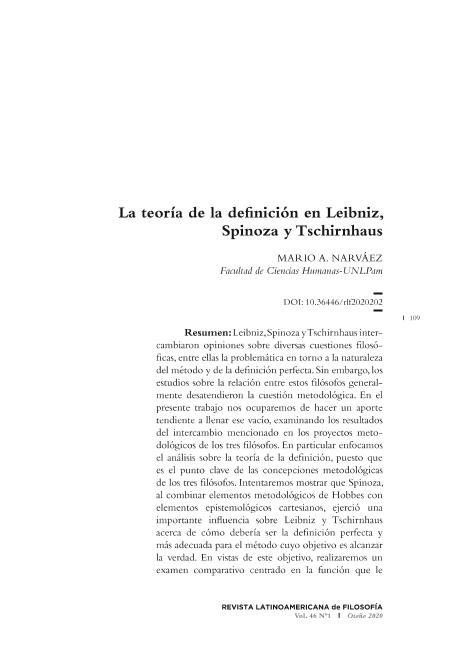Artículo
Leibniz, Spinoza y Tschirnhaus intercambiaron opiniones sobre diversas cuestiones filosóficas, entre ellas la problemática en torno a la naturaleza del método y de la definición perfecta. Sin embargo, los estudios sobre la relación entre estos filósofos generalmente desatendieron la cuestión metodológica. En el presente trabajo nos ocuparemos de hacer un aporte tendiente a llenar ese vacío, examinando los resultados del intercambio mencionado en los proyectos metodológicos de los tres filósofos. En particular enfocamos el análisis sobre la teoría de la definición, puesto que es el punto clave de las concepciones metodológicas de los tres filósofos. Intentaremos mostrar que Spinoza, al combinar elementos metodológicos de Hobbes con elementos epistemológicos cartesianos, ejerció una importante influencia sobre Leibniz y Tschirnhaus acerca de cómo debería ser la definición perfecta y más adecuada para el método cuyo objetivo es alcanzar la verdad. En vistas de este objetivo, realizaremos un examen comparativo centrado en la función que le asignan a la definición en la estructura metodológica, así como también en el modo en que cada uno concibe la naturaleza de la misma. Leibniz, Spinoza and Tschirnhaus exchanged opinions on various philosophical questions, among them the problematic about the nature of the method and the perfect definition. However, studies on the relationship between these philosophers generally ignored the methodological question. In the present work we will make a contribution to fill that gap, examining the results of the exchange mentioned in the methodological projects of the three philosophers. In particular, we focus on the analysis of the theory of definition, since it is the key point of the methodological conceptions of the three philosophers. We will try to show that Spinoza, by combining Hobbes’ methodological elements with Cartesian epistemological elements, exerted an important influence on Leibniz and Tschirnhaus about what the perfect and most suitable definition should be for the method whose objective is to reach the truth. In view of this objective, we will carry out a comparative examination focused on the function assigned to the definition in the methodological structure, as well as in the way in which each one conceives the nature of the same.
La teoría de la definición en Leibniz, Spinoza y Tschirnhaus
Título:
The Theory of Definition in Spinoza, Leibniz and Tschirnhaus
Fecha de publicación:
08/06/2020
Editorial:
Centro de Investigaciones Filosóficas
Revista:
Revista Latinoamericana de Filosofía
ISSN:
0325-0725
e-ISSN:
1852-7353
Idioma:
Español
Tipo de recurso:
Artículo publicado
Clasificación temática:
Resumen
Palabras clave:
DEFINICIÓN GENÉTICA
,
CONOCIMIENTO
,
MÉTODO
,
VERDAD
Archivos asociados
Licencia
Identificadores
Colecciones
Articulos(CCT - PATAGONIA CONFLUENCIA)
Articulos de CTRO.CIENTIFICO TECNOL.CONICET - PATAGONIA CONFLUENCIA
Articulos de CTRO.CIENTIFICO TECNOL.CONICET - PATAGONIA CONFLUENCIA
Citación
Narváez, Mario Andrés; La teoría de la definición en Leibniz, Spinoza y Tschirnhaus; Centro de Investigaciones Filosóficas; Revista Latinoamericana de Filosofía; 46; 1; 8-6-2020; 109-129
Compartir
Altmétricas




